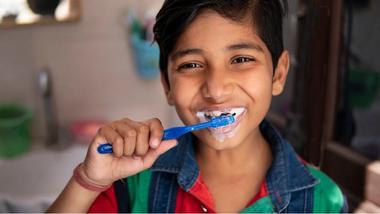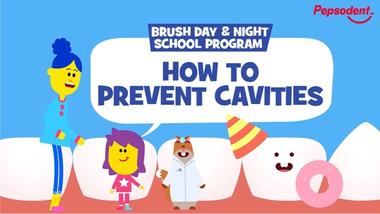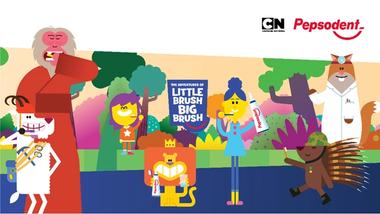
Taking care of oral hygiene
Average read time: 9 minutes
Every smile matters. That’s why our Smile oral care brands – Pepsodent, Signal, P/S, Mentadent, Aim and Prodent – have been on a mission to encourage good brushing habits for over 25 years.

One in two people live with untreated tooth decay
The World Health Organization estimates that oral diseases affect one in two people, compromising healthy smiles all over the world.
Poor oral health impacts children’s self-esteem and attendance at school, and we know that poor oral hygiene can lead to long-term health issues and even life-threatening illnesses such as heart disease. Our oral care brands study the impact of oral disease to inform our programmes.
A simple solution
The solution to ensuring good oral health is simple. First, brushing day and night with a fluoride toothpaste. This reduces the occurrence of cavities by 90% compared to not brushing teeth at all. And second, regular access to professional dental care to keep teeth healthy.
3 billion People don’t brush their teeth twice a day
But we know that an estimated 3 billion people do not brush their teeth twice a day. Most use less than half the amount of toothpaste dentists recommend for brushing properly. And 1 billion or more do not use fluoride toothpaste at all.
Neglecting oral care and low awareness of good oral care habits are often compounded by a lack of access to professional dental care. It’s particularly difficult in developing countries, where there is often an uneven distribution of oral health services, a shortage of dentists and high treatment costs. This inequality of access leads to some shocking statistics. For example, by the age of 65, the average Indonesian has lost 11 teeth, while in Ghana, four out of five people lose all their teeth.
Our oral care brands are present in more than 25 countries across Asia, Africa, Latin America and Europe. Through our communications, we promote the benefits of taking care of our oral health so that, like Canhia in this video, everyone can be proud of a healthy smile throughout their lives.
We’re on a mission
113 million People reached through our programmes 2010-2021
Our Smile brands’ purpose is to unleash the power of healthy smiles by eradicating oral disease. Through our Brush Day & Night educational programmes, free dental checks and TV adverts promoting the importance of oral health and hygiene, we’ve reached more than 113 million people since 2010. That’s more than double the number of people we set out to reach with our Unilever Sustainable Living Plan (PDF 8.02 MB).
As part of our Unilever Compass, we’ve committed to a new goal from 2021 onwards to improve health and wellbeing through our brands, including oral health.
Take action through our brands to improve health and wellbeing and advance equity and inclusion, reaching 1 billion people per year by 2030.
We will focus on: gender equity; race and ethnicity equity; body confidence and self-esteem; mental wellbeing; hand hygiene; sanitation; oral health; skin health and healing.
We’re continuing our long history of educating people – particularly children – on the benefits of brushing properly day and night. But now we’re adapting our approach, capitalising on the power of technology to reach more people, more effectively. And we’ve started to tackle inequalities in health treatment by providing free and easy digital access to professional dental advice and care through our brands’ teledentistry services.
Establishing good practice early is crucial
Research shows that learning good toothbrushing habits at a young age can ingrain good habits for a lifetime.
30% increase In children’s twice-daily brushing after our programmes
Since 2005, we’ve been working in partnership with the FDI (World Dental Federation), an international organisation that represents over a million dentists. Together, we’re working to improve oral health in over 25 countries through our Brush Day & Night educational school programmes, which run for 21 days.
Why 21 days? Because that’s how long something needs to be practised for it to become a habit. That’s the theory behind our Five Levers for Change (PDF 3.85 MB) methodology. In our school programmes, we give kids practical tools, like a 21-day calendar with stickers, to keep track of their toothbrushing.
FDI studies have shown that the 21-day programmes have been successful in increasing twice-daily brushing behaviour in children by 30%.

Our school programmes go digital
We’ve brought the power of digital to our long-standing school programmes, equipping children with the knowledge to take care of their oral health through fun-filled educational videos and interactive tools featuring our beloved brand characters, Little Brush and Big Brush.
When Covid-19 disrupted schools, our new digital programmes enabled oral health education to continue at home. The programmes replicated our classroom-based lessons, delivering the same important learning material. They also enabled kids to record their progress online and keep track of their family’s brushing habits.
Our research from March 2021 showed that while people were generally paying more attention to their health during the pandemic, this wasn’t the case for oral health. Our survey showed there was a drop off in brushing compared to 2018 – with 5% less twice-daily brushing by parents and 11% less for children. So our home-learning digital programmes and materials became more important than ever.
Getting kids excited about toothbrushing
We know that many parents struggle to get their children to brush their teeth day and night. Over the years, we’ve produced comprehensive physical materials to explain good brushing habits, and we’ve now introduced them in digital form too.
The Adventures of Little Brush Big Brush
The Adventures of Little Brush Big Brush is a 21-episode digital video series that we created to make learning about oral hygiene exciting for kids, while helping them build good toothbrushing habits.
Packed with entertaining animal characters, the series brings young children on an adventure around the world and shows them how to brush the right way, for two minutes.
The videos can also be enjoyed in a storybook format– perfect for bedtime stories.
Putting the smiles into screen time
When the Covid-19 pandemic disrupted routines in schools, we knew we had to do more to help children maintain good oral health habits while they stayed home. So we looked for a solution that would make learning fun for children during lockdown.
We know that 61% of parents watch cartoons with their kids, while 68% watch videos online together. In fact, learning through edutainment (education through entertainment) increases motivation and engagement and enhances concentration. So in 2021, with the help of Cartoon Network, we took the world of Little Brush Big Brush to television screens for the first time, reaching families around the world with new cartoon episodes on oral health.

Our edutainment content supports millions of parents in teaching their children the importance of brushing day and night. It also highlights topics like how sugar can cause cavities and the importance of visiting the dentist.
By teaming up with Cartoon Network, we’re not only ensuring our content is appealing, we’re also making our Little Brush Big Brush content accessible to children and parents across digital, social and TV channels. At launch, our cartoon series became available to around 18 million households in Indonesia, Vietnam, Italy and France, helping families learn about positive brushing and oral hygiene habits.
The Adventures of Little Brush Big Brush allows parents to let their children have fun watching a cartoon, while knowing they are learning about good oral health. Learning about good brushing habits doesn’t have to be boring!
Justyna Janssen, our Global Brand Director, Smile Engagement
Teledentistry brings new ways to consult dentists
As well as using digital technology to educate children and their families, we’re now using it to find new routes to deliver essential healthcare too.
Only 10% Of people in developing countries see a dentist once a year
According to the World Health Organization, while 82% of people in high-income countries have access to oral health services, that figure plunges to just 35% in low-income countries. Only 10% of people see a dentist once a year in developing countries. A chronic shortage of formally trained dentists and the difficulty of getting professional dental care in rural areas, combined with prohibitively high costs, means that visiting the dental clinic is too often delayed. As a result, too many people lose teeth to decay, which could have been avoided.
We believe that having access to a dentist should be a right for everyone. So our brands are now providing a teledentistry service, offering free dental consultations via mobile devices.
The service can be used to speak to a dentist who can help identify the causes of an oral issue and provide professional advice to address the problem at home, where possible. If at-home care is not suitable, the patient is given advice about how to seek professional help at a clinic.
The teledentistry service has been launched in our largest South East Asian markets and we have plans for more countries to follow. For countries that have not yet implemented our teledentistry service, we will provide on-ground dental camps with free check-ups. Ultimately, our goal is to help over 200 million people across the world take control of their oral health and act on their tooth pain early, instead of delaying speaking to a dentist, so pain, costly and complicated treatments, and tooth loss can be avoided.
World Oral Health Day
World Oral Health Day falls on 20 March each year. It’s a great opportunity to remind people about the importance of brushing day and night, and how good oral health has a positive impact on general health, wellbeing and quality of life. Together with the FDI World Dental Federation, we raise awareness of this important, yet simple message.
Every year, we design creative online campaigns, mass media coverage and even large-scale toothbrushing events with children pledging to brush day and night. By organising virtual events and leveraging social media, we’re rallying families across the world to build good toothbrushing habits together that last a lifetime.
#TalkToADentist
On World Oral Health Day 2022, through our Don't Wait Until It's Too Late #TalkToADentist campaign, we provided free teledentistry services and free check-ups via dental camps to tackle barriers to access, such as distance and dentist availability. We focused on encouraging people not to wait until it’s too late, but to seek professional dental care at the earliest warning signs.






